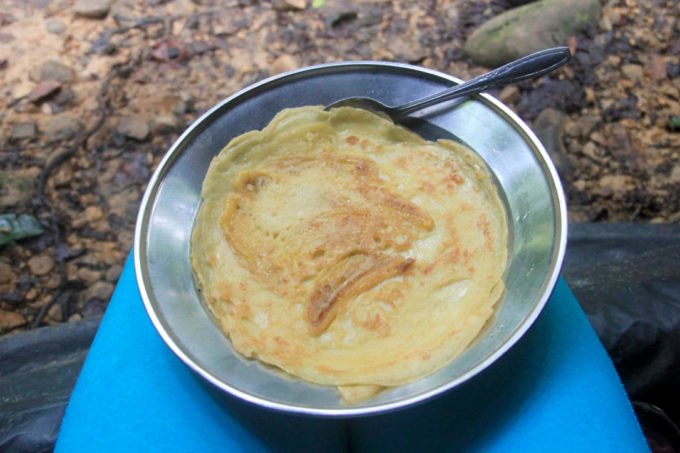
You’d Dream About This Pancake For Four Years, Too

You’d Dream About This Pancake For Four Years, Too
Banana pancakes in North Sumatra
Before I even knew what was on the menu for breakfast, the orangutan mother and her baby had started eating theirs. I could hear them moving, rustling. Their breakfast would consist of whatever was reachable among the thick, leafy branches over 100 feet above me in the canopy of the Sumatran jungle. Our tent, pitched slightly uphill from a medium-sized stream, felt a world away from civilization, but in reality the city of Bukit Lawang and the surrounding palm oil fields weren’t too far away, and occasionally a bar would show up on my cellphone.
I had my hopes up about my own breakfast after I’d seen our guide Adi pull a bunch of small, yellow bananas from a black plastic bag the day before. I’d been dreaming about this pancake—thinner than American ones but a little thicker than French crepes, with pieces of caramelized banana—since I’d left Indonesia four years earlier. It’s a simple dish for breakfast or a snack you find across the sprawling nation of thousands of islands. It likely has its roots in the Dutch colonial period and their version of the pancake, pannekoeken. Sometimes it comes with a sliver of lime to squeeze on (a favorite in Bali and the Gili Islands), other places will drizzle chocolate sauce or condensed milk on top (a Jakarta street food option), and occasionally a dash of sprinkles is added.
The day before, I hadn’t eaten much. All of my clothing was sticking to me in places I didn’t even know were possible. I’d started sweating as soon as I had woken up and all I craved was water, and more water amid the haze of the dense jungle. I’d given up hope of seeing an orangutan in the wild. After all there was no guarantee—deforestation, palm oil plantations, farmers harvesting rubber and cacao are all encroaching on the natural habitat of orangutans.
I also had no idea if Adi knew how to make pancakes. Was he trekking with flour, sugar, and oil in his bag? Would there be a large enough pan at the campsite?
The light was beginning to fade, and as we approached our campsite I could see a giant pan resting on logs. Then Adi froze and pointed high above the tent, and there she was. A large adult orangutan slowly moving, using branches as links between trees, and then I saw the second pair of eyes amid her red hair—a baby clinging to its mother. Our eyes locked and we examined each other for a minute before some berries among the branches became more interesting to them.
In the morning, I could smell the smoke from the fire and hear chopping noises. “Pisang pancake,” Adi said using the Indonesian word for banana as he approached with a silver-colored metal camping dish. As I finished the last bite of sweet banana and craved another, the mother and her baby had already started to move on—it would be lunchtime soon.